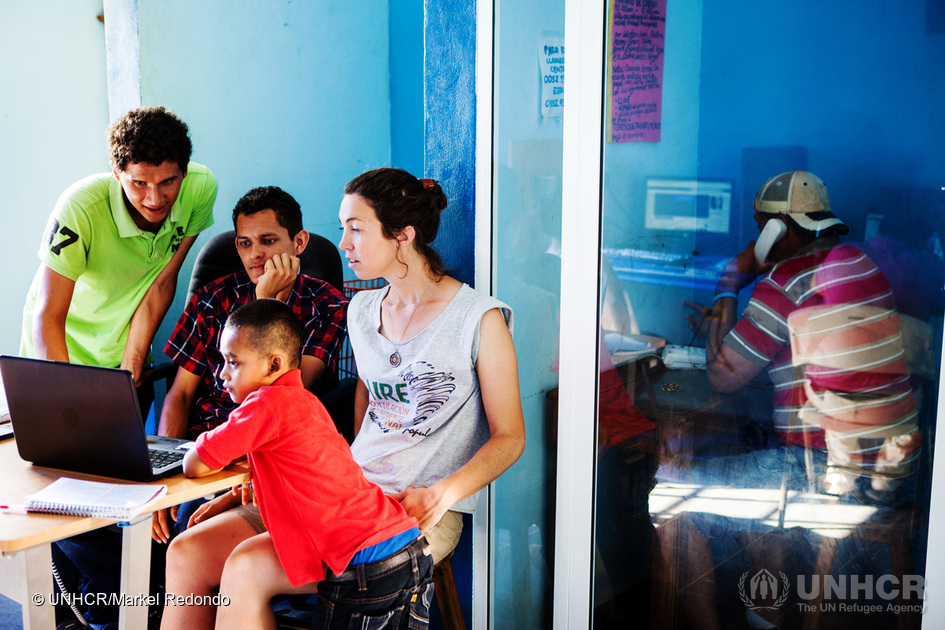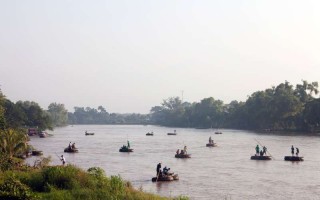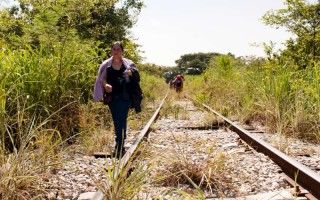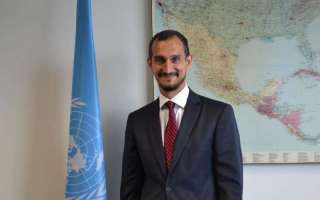
A volunteer gives some technical advice in the computing room at La 72 migrant shelter in Tenosique, Mexico. © UNHCR/Markel Redondo
Since 2011, Friar Tomás González Castillo has welcomed those fleeing violence and persecution in northern Central America.
TENOSIQUE, Mexico – At a shelter near the Guatemalan border, a Mexican friar provides protection and humanitarian assistance to people fleeing violence, extortion and forced recruitment by gangs in the north of Central America.
Tomás González Castillo, a member of the Christian religious order of Franciscans, opened the La 72 shelter in the town of Tenosique in 2011 and since then it has welcomed more than 50,000 people.
It accommodates up to 250 people at a time, including single mothers, minors and a growing number of families, as well as lesbian, gay, bisexual, transgender and intersex people, collectively known as LGBTI, from the north of Central America.
More than one thousand people arrive each month at the shelter, where they receive shelter, counselling, legal assistance and home-made meals.
“All of them are victims of forced displacement due to different circumstances,” Friar Tomás said. “Economic reasons, widespread violence, discrimination based on sexual identity, fleeing murder, or simply because they are women.”
“The first thing we do is fill the stomach. Everyone who comes in is hungry after a long walk.”
When refugees arrive in Mexico, they have few belongings but carry a huge emotional burden as a result of the violence and fear they have experienced in their home countries and during their journey. The first step towards recovery is having a good meal and a safe place to stay.
“The first thing we do is fill the stomach,” said Friar Tomás. “Everyone who comes in is hungry after a long walk.
“After we cure the physical pain comes the most difficult thing – to cure the pain inside, the escape from their country.”
La 72 is one of a network of shelters – or safe spaces – in Central America and Mexico which provides basic assistance, information on how to apply for asylum, referral services for those with special needs, and safe accommodation.
Friar Tomás González Castillo opened La 72 shelter in Tenosique in 2011.
Since La 72 opened in April 2011, it has welcome roughly 10,000 people per year.
In the past two years, shelters in Mexico have seen the demand for their services nearly double as the number of people in need of protection continues to grow. The shelters, often run by civil society or church groups, have also received more than 1,500 asylum-seekers released from migration detention centres in a programme that began in 2016.
The network of safe spaces in Central America and Mexico is one of the examples of good practice being discussed at a two-day conference that opened today in Geneva, as UNHCR, the UN Refugee Agency, leads the process to develop a global compact on refugees.
The High Commissioner for Refugees was given that task by the UN General Assembly as part of last year’s New York Declaration for Refugees and Migrants.
The Geneva conference will examine how governments, with the help of civil society, faith-based organizations and international organizations, can establish systems to ensure refugees are received in a safe and dignified way.





